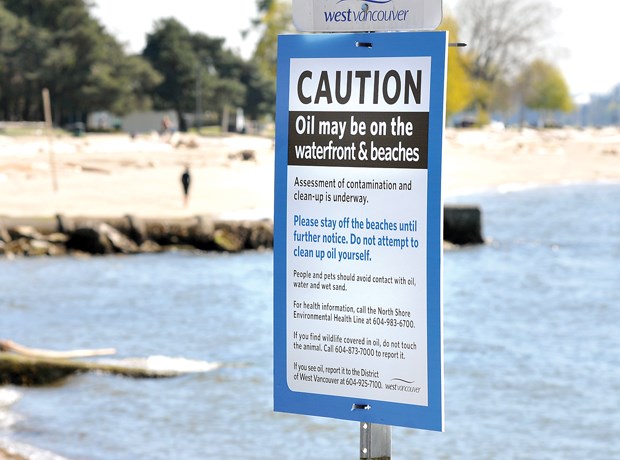The District of West Vancouver is talking to the City of Vancouver about joining forces on an independent environmental assessment of the oil spill that continued to wash up on Burrard Inlet beaches this week.
“We want to own our own data and our own processes,” said Jeff McDonald, spokesman for West Vancouver, on Thursday.
Word of an independent environmental assessment by the municipalities came as the department of Fisheries and Oceans closed harvesting of shellfish and ground fish in waters off West Vancouver shores as a precautionary measure.
Fishing of shellfish and ground fish is currently closed throughout Burrard Inlet, including the waters off Ambleside and Dundarave beaches and Lighthouse Park.
The closure will be reviewed once lab results show whether marine life has been affected by the oil spill.
On Thursday, District of West Vancouver crews went out to post bigger signs in popular crabbing areas like Ambleside, John Lawson and Dundarave piers to reinforce that message.
McDonald said the municipality made the move after receiving a number of calls from residents saying people were still crab fishing in those areas. In response to public concerns, district crews also doubled the number of signs warning of beach closures and extended them to Horseshoe Bay.
Dr. Mark Lysyshyn, medical health officer for the North Shore, said skin or lung irritation is the biggest immediate health risk from coming into contact with the oil.
In terms of longer-term health risks, “Some of these hydrocarbons in this mixture are also carcinogens,” he said, so it’s a good idea to stay away.
As cleanup continues in West Vancouver, “The good news is the total amount of shoreline where oil has been found is only a few kilometres in West Vancouver,” said McDonald. “The not-so-good news is there are lots of small areas where oil has come ashore.”
In many of the areas where oil was cleaned from the shoreline during the first days after the spill, more oil later came in on the tide, said McDonald. “They are still having to go back over those areas,” he said.
District of West Vancouver environmental staff has been accompanying crews from the Western Marine Response Corp. to make sure the cleanup is thorough, said McDonald.
“They know the shoreline well and they’ve been aggressive with the (cleanup crews),” said McDonald.
“We consider any oil on any beach problematic.”
McDonald said West Vancouver has been tracking all costs involved in the spill response and will be making a claim for those against the shipping company involved.
Researchers from the Vancouver Aquarium have also been collecting samples of water, sediment and shellfish from the area around Burrard Inlet, including Ambleside.
Preliminary results from Ambleside showed no volatile lighter compounds from the oil spill but did show some low concentrations of heavier PAH hydrocarbon compounds in sediments from both the high and low tide line, said Peter Ross, head of the aquarium’s Ocean Pollution Research Program.
Ross said researchers will follow up and collect samples of sediments and mussels from Ambleside and Dundarave for a more detailed analysis.
Chief Ian Campbell of the Squamish Nation said he’s also very concerned about the spill and its potential impact on the environment.
“We share the concern of many communities here,” he said, adding the Squamish Nation wasn’t notified of the spill until 17 hours after it happened.
“We have to question the legitimacy of the federal government saying they have world-class (spill response) standards.”
Video below courtesy of the Vancouver Aquarium Marine Science Centre.



